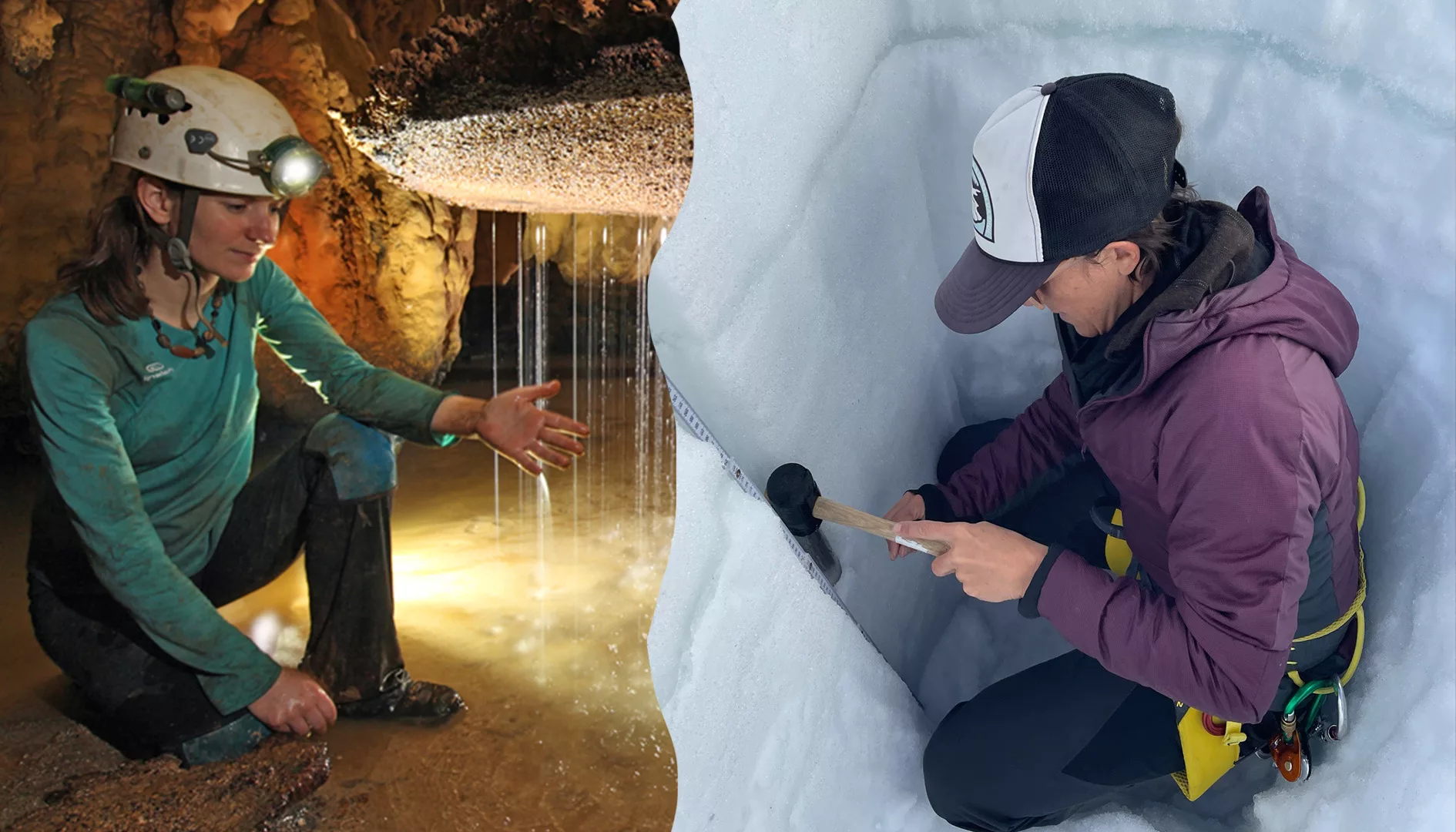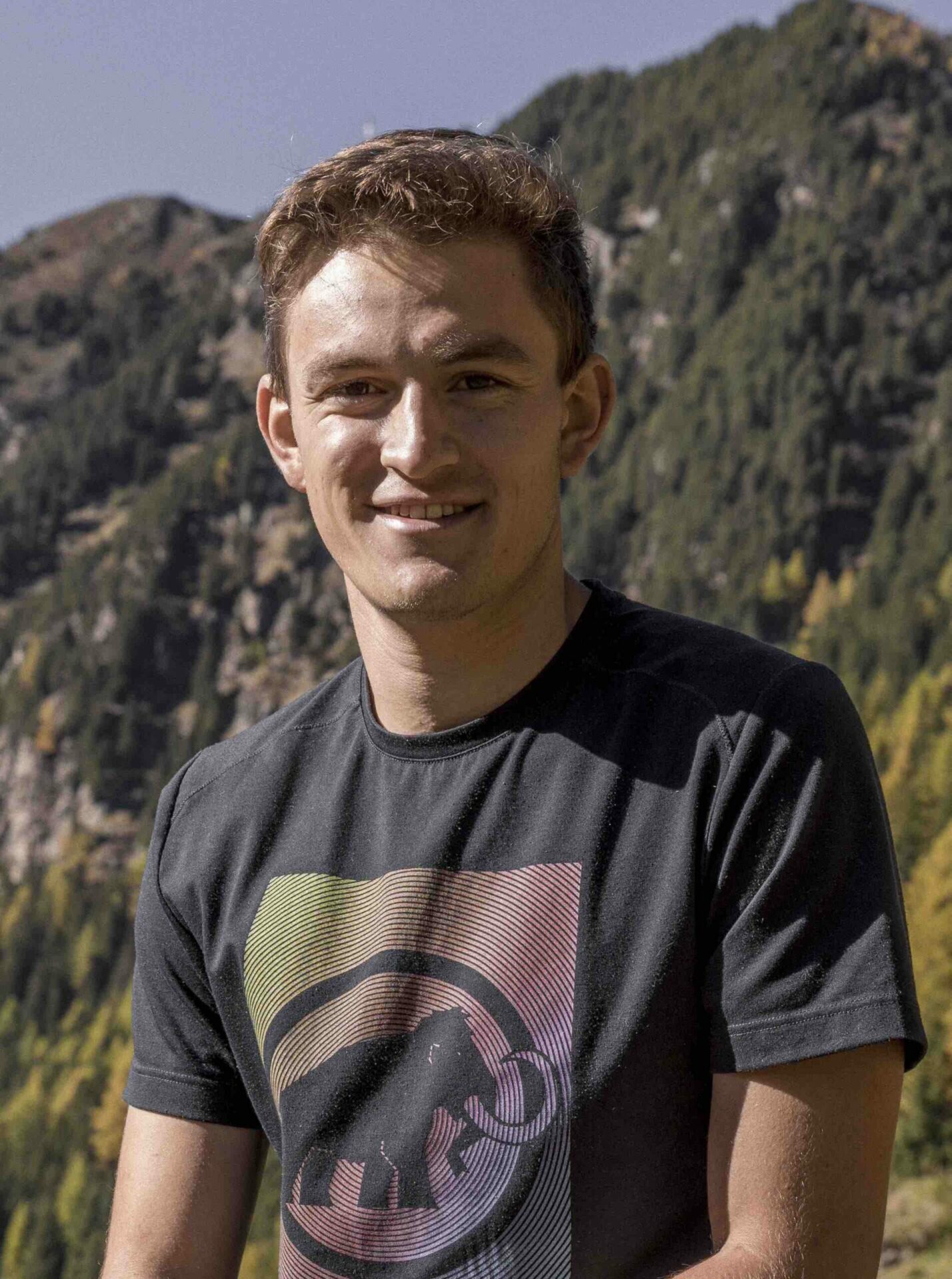If she can see it, she can be it!
Women have come a long way in science. Still the goal of equity is not reached. But fortunately there are lots of positive remarks to make. We were able to talk to Gina Moseley, mum to a young daughter and professor of paleoclimatology at the University of Innsbruck, with very ambitious plans for the near future. Lindsey Nicholson, glaciologist at the University of Innsbruck, founder of Girls on Ice Austria and member of the POW AT Science Alliance also spent some time with us. They both were born in the UK, but more important of a connection is that they both have a lot to offer when it comes to a conversation on gender equality and the things we try to do to make it better in the future! Get a short glimpse into their lifestyle, problems, expeditions and their personal role models and motivation in the following interview!
Thomas: Your email signature, Gina, says: “I may send emails outside of normal office hours. Please do not feel pressure to reply outside of your normal office hours.” Besides that, as a climate activist, I really can relate to the sentence and I’m very grateful for you to put this in every email you send. When I read this, I wondered, is Gina a workaholic?
Gina: Haha! … No, I would say that this is partly out of a necessity and partly because of the parenting situation. I often work in the morning and late in the evening so that I can spend some time in the afternoon with my daughter.. I don’t want her to be in child care all day where I would miss out on her growing up. Also, I think we’re fortunate in academia that we don’t have a nine to five job and can work it at night if we want to. I like working at night, I always have and I am productive. Partly though, I am also a workaholic out of the necessity of having so many things to get done. I find it really stressful if people say “Take a break” or “Take time for yourself”, because then the workload just builds up and that’s not a healthy position for me to be in. I prefer to get things off my desk rather than take a break and still have to do that work, because it doesn’t disappear.
Lindsey: About that specific email line, I’ve seen it a lot of times on emails from academics in the UK. So, there’s also a kind of cultural thing that maybe we’re exposed to from more of that contact. But it’s a good statement to have. I’m wondering, is that where you also saw it and thought this is a good idea or how did you come to add that to your emails?
Gina: I did see it on an email and I did think: “Yeah, that’s a good idea.” I think it’s easy with emails to send one and then the receiver can choose not to be checking those emails. But, in the world of Whatsapp it’s so easy to contact people at all times. In my research group, we have a Whatsapp group, but I try not to use it outside of normal office hours because the receiver will know there’s a message from ‘the boss’ even if they choose not to open it.
Thomas: Is being a workaholic necessary for a woman to work her way up to be a leading researcher, maybe more necessary than for a man?
Lindsey: Unfortunately, academic success requires a degree of workaholism, regardless of gender. What I do think is that, if I look around – it’s not true of everybody – many people who’ve reached the top professor jobs have support at home. That’s a bit of a sweeping statement, but still there’s a societal expectation of women taking on those household and family roles. And from the international scientists I’ve worked with here in Austria, people coming from Spain and Britain always say this pressure is much greater still in Austria. I don’t have a family, so, it’s not my experience, but I’ve heard it from other academics.
The second area that women have more burden is that, as long as we’re still a minority in the university system, every time there’s a committee for something and you have to have gender equality, a woman has to join the committee. That means, if you’re in the minority, you’re asked to join way more committees and hiring panels. What we obviously hope is that in another generation it will be equalised and that won’t be the case.
I also think that success in academia often requires somebody to lobby for you a little bit. Maybe that’s true of all working environments. People tend to lobby for – I think it’s human nature – people who are like them. Specific people have this lobbying power to nurture successors, or to draw people into new interesting projects that might be career game changers for them. As long as that power is held only by specific genders or races, unless they’re very enlightened – which they may be – there can be a bias in who gets pulled into these opportunities.

Gina: I agree that everyone is a workaholic. This is especially true at the academic professor level, either male or female. Something I’ve been thinking recently is that academia is not a job. It’s a lifestyle. This is part of me sitting there at night and on weekends, working on my science outside of normal hours. And it’s because, actually, I’m really interested in it, even if it wasn’t my job I’d still be interested. We also make friends along the way within our jobs, many of those are international.
Lindsey: Yeah, there are some huge pluses that come with that. And some negatives. But again, it doesn’t feel like working if you’re really into the topic. Somehow you also get promoted out of what you want to do. I now spend almost all my time in meetings and answering emails and doing administration. Which is why, if I want to actually answer a scientific question, I only have the weekend left.
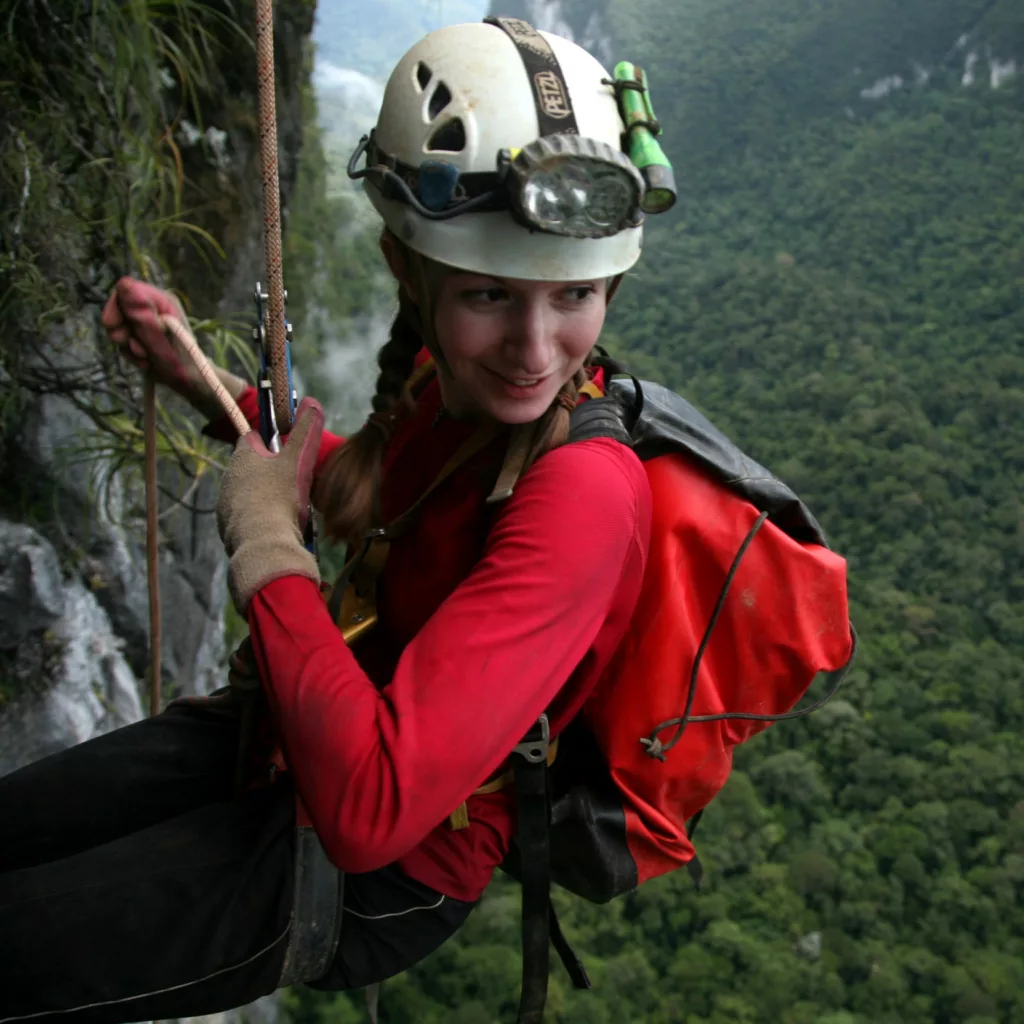
“If you don’t put yourself out there, you can’t be chosen. So, just give it a go! What’s the worst that can happen?” – Gina Moseley
Thomas: I would like to talk about another thing – it’s more about the lifestyle part of your jobs. You are also doing some expeditions for your research and you have already done many. Those are often physically exhausting journeys. And in the past it was mostly reported about men being out in ice and wind to study new land and water. So it was in alpinism with climbing new peaks ever since. Have you had to overcome lots of barriers in planning and going on these expeditions?
Lindsey: Personally, no. And Gina is shaking her head, too. There’s a lot to talk about in this theme, but primarily I think it’s that the storytelling narrative has been held by the male storytellers. Most of the work we do shouldn’t be dangerous, it should be within the limits of the people and their training to do. Actually, I find that embarrassing, because I don’t think any professional who’s going into the field should be promoting the fact that it’s very risky what they’re doing. Because, what it actually means is, that either they’re going to the wrong places, or they don’t have the skills.
Fieldwork can be physically demanding, but also mentally demanding and the way you have to work and camp in remote teams together is also sometimes quite socially demanding as well. But I’ve always worked in a very supportive group that understands the challenges of that and we’re sympathetic to each other, you know? And I might not be the strongest person in the team, but sometimes I am, actually. I’ve been on top of Kilimanjaro where I was the only person who didn’t have altitude sickness. So, I had to go back and do all the repair of the weather station, while the other people stayed in the tent because they weren’t feeling well. So it doesn’t necessarily have to be a gender thing. For sure some of the people I was with on that trip could carry more than me if they had to. But, at the end of the day, we wouldn’t have got the work done if I hadn’t been there.
Gina: I agree as well. I’ve never faced any barriers when it comes to fieldwork. I look at generations before me and there’s women there as well. It tends to still be the case that there are more men around than women and I think that’s not through a selection process that’s happening at this level, but that’s just how society has split the genders before they get to academia. Talking about storytelling – I have a lot of media connections at the moment through the Rolex partnership for my upcoming expedition, which is wonderful. But I’m always asked what the dangers will be on the expedition. I mean, if something goes wrong we’ll be really far away from help, but because of that, we are so well prepared, I hope. Fingers crossed!
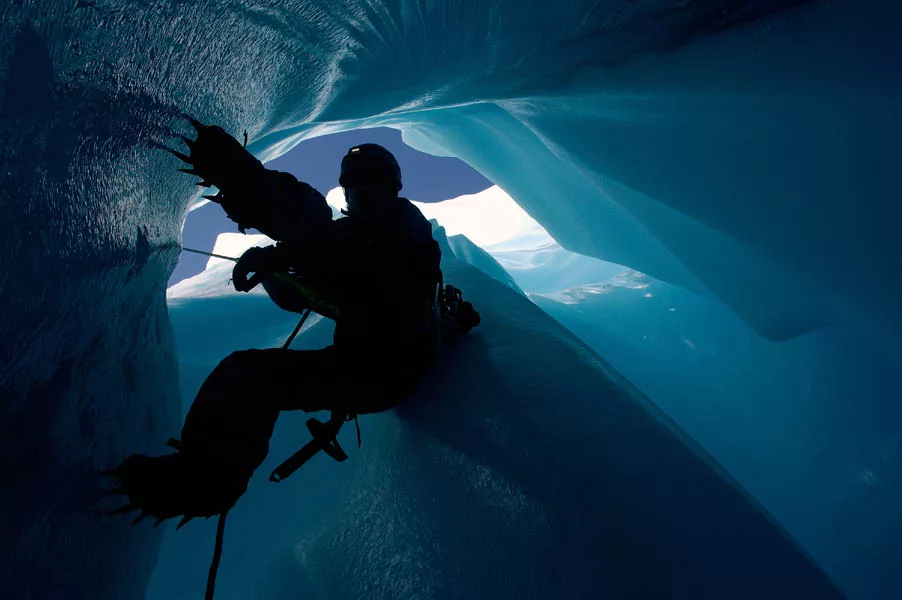
Thomas: Next question leads to a completely different topic Lindsey. You’re showing voluntary engagement and this is not self-evident, may it be in science or in today’s society in general. So, you’re part of the science alliance of Protect Our Winters Austria. How did this start and why do you spend time for organizations, getting no money out of it. Is it typical for scientists or maybe just for women in science or do women tend to do so more?
Lindsey: Especially about topics like climate change, it feels like a duty to do this. In the end my salary is paid by taxpayers money, and I would like to return some of that knowledge to the people who are actually paying for it. It’s a bit harder for me here in Austria as my German is not good enough yet to do a TV interview or panel discussions. So I’ve chosen the opportunities connecting my research to society where I can be most active. That’s partly why POW is a good one for me, because it’s running in quite an international way. And second, I am pretty passionate about doing winter sports as well. So there’s this double overlap. I also think it’s a nice example of an organisation that works in a kind of grey area, because one could always say: “We don’t have to do any winter sports at all”. But such statements are quite demotivating for many people. So, being active and engaged around the things that we do want to have in our lives is a more powerful and positive message. About, if all scientists feel this drive to communicate or feel like it’s their duty, I think that’s mixed. I feel like more do than don’t, nowadays. The question about if that’s gendered is a really interesting one and I don’t know the answer. I don’t even really have a strong impression, but it could be.
Thomas: Lindsey, you are also founder of Girls on ice Austria as you’ve already mentioned. An initiative that wants to encourage girls at the age of 15 to 17 for scientific research by showing them, after an application process, what you can find out about nature and climate by studying the bio- and cryosphere around glaciers. Do you think such organisations are necessary to motivate girls and women to go into scientific research in general? And if yes, why is this extra effort needed?
Lindsey: I think the studies showed that it still is needed. Young people are equally interested in science up to some point and then it tails off in the female identifying section. One can only assume this is something that has to do with a lack of encouragement or shifting societal norms as they get older or so. In Girls on Ice and the other inspiring girls expeditions, probably the primary aim is less to try and persuade these young people into science, but simply to support and mentor them to be leaders. So, if you’re told: “Maybe this isn’t a career for you.” If there’s even a feeling like “Boah, that’s not a very feminine career” or ”I don’t see anybody doing this”, it doesn’t feel normal to go into it. First, we try to expose people to the idea that there’s a wide diversity of female role models, who can be fulfilling these positions, just to know it is possible. Some of the girls come in there like: “I’m worried about the camping.”, “I’m scared about the science.”, or – we do art classes – “I can’t draw.”So it’s more about doing this kind of stuff than specifically getting into science.
In earth science, female students at the undergraduate level are pretty high now. It used to be that there was a big difference. But there’s an expression in English called the “leaky pipe” in academia, describing how in the early stages of scientific research careers the gender balance in science is quite equal, but as you go further and further through the career progression, more women leave in comparison to men. There’s, I think, a structural, societal and practical set of reasons for all of that. So that’s where the main work has to go, rather than actually getting people interested. Our faculty is doing quite well. Recently – I’ve been in this faculty for twelve years or longer now – we have more senior female positions, Gina being one of them at a professor level, than we had when we started. So a lot of this work has happened in the time that I’ve been here.
Gina: This has been through specific initiatives. Ivana Stiperski and myself, we both received the Ingeborg Hochmair professorship. Ingeborg Hochmair is the CEO of MED-EL, the cochlear-implant company in Innsbruck. She provided the funds to promote women from mid-career positions to higher career positions. Our faculty received two of those in recent years. After five years, the funding should have finished but we’ve all gone on to have permanent positions within the university.
Lindsey: And I wanted to say, the university also has a huge program for stimulating interest in MINT (Mathematik, Informatik, Naturwissenschaft, Technik; engl. STEM). There’s this MINT summer school. So, when you were asking: “Do we need to still encourage women for science? Is that what Girls on Ice is about?” One thing I think is important to note is that there are still reasons to motivate young women into science but that’s already covered at the University through summer schools and internships which are focused on bringing minoritized genders into sciences. So, Girls on Ice doesn’t really have to do that work, we’re more about mentoring and inspiring and giving the feeling of capability.
Gina: I’ve got a friend here who’s a nurse now. In school, she wanted to be a geologist and she was blankly told: “No. That is not a career for you. You are a girl, become a nurse.” I don’t really see those things now, but for our generation that definitely happened.
Lindsey: I always like that expression: “If she can see it, she can be it.” I think this is a really, really powerful line. That is one of the things that’s the best I can do in my day to day work, that’s what Girls on Ice is trying to do. This would have worked for your friend if she’s known you before or seen somebody in the position. Then you’re like: “Okay, that’s an option for me.” Otherwise, you live within your societal box, whatever the societal box is defined by, gender or anything else. So, it’s quite good to see different role models. One of the things I do – that’s most uncomfortable for me, actually – I really try hard in conferences or seminars to put my hand up and ask questions, just because there’s statistical proof that women ask less questions in public forum space because that space has been traditionally taken up more by the men.
“It doesn’t require you to be a woman to inspire confidence for speaking up!” – Lindsey Nicholson
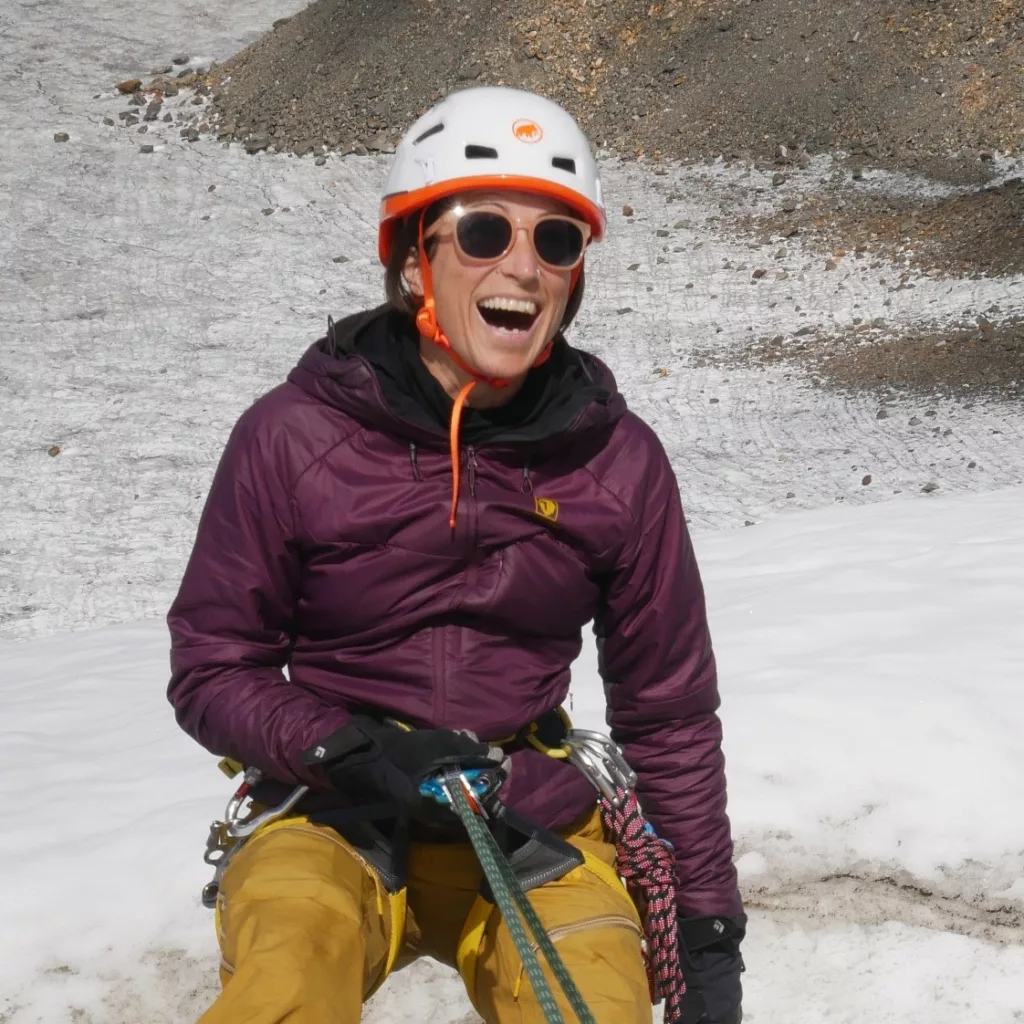
Thomas: Coming to an end, I would like the readers of any gender to learn something for their own life by your experiences. Climate change communication is something activists, media, but also science pretty much struggles with. How do you personally get along with explaining your knowledge to people and stepping up against possible provocative questions, may it be in interviews or discussions or anything?
Gina: I have put myself in lots of different situations. I did science week with my nieces in the UK last year, they are six and eight. I got their class to watch some videos about my work and then to prepare questions based on what they’d seen. Together with my nieces who were acting as the interviewers, I answered the questions. It was incredible. The six year olds were asking about climate change. It’s already a conversation for them. It was so cool, the kids are into this topic, they really are. There’s no provocative questions, the kids just are curious. Questions from the media on the other hand tend to be the same ones over and over again. The situations that are more challenging are normally public talks. You don’t necessarily know who your audience is going to be. But still there’s no such thing as a provocative question, because at the end of the day, we’ve got science and facts to reply with a sensible answer. Whether they [the audience] accept the answer or not is hard to say, but someone in the audience might take it on board. Talking to friends and family, that’s just a very informal level, not so structured. But even for my own family, years ago climate change was something that was in the media and they weren’t really in that conversation and now they’re totally in that conversation. I never push it on them. But occasionally, my dad will say: “I met this guy today when I was delivering this thing, and he was asking me about this. What do you think?” They come up to me with questions. And then there are others that just don’t want to be in that conversation and that’s fine, too.
Lindsey: I try to prepare for curveball questions or even have some general things ready for when I’m asked out of my field. I think I’m often asked things that are general and very much outside my field of expertise. But what I can do is then loop that back to restating clear facts that I do know about. Even the broadest basics, talking about energy consumption and planetary boundaries.
Gina: Last November I had an experience at the Kendal Mountain Festival. I was asked to talk about my caving expeditions, but I said I’m only going there if I can also do a small talk on climate change. So I did that in a very informal setting – in a tent – and I gave the scientific basis behind climate change. People still want to know “What can we do?” So I gave a few moments to this at the end. Given the informal personal setting, I focused on individual actions. At the end, someone came up to me in tears. He was so angry with me for not talking about systematic change. He said: “Maybe you don’t believe in systematic change.” And he was actually crying. There’s a lot of emotion and personal energies associated with the climate change discussion. In that moment I was a little bit shocked, honestly. Within these 30 minutes, it really wasn’t the focus and I could not talk about all opinions.
Lindsey: For example, when Greta Thunberg was criticised for taking a boat to the US because she didn’t have to go to the US at all, I find this negative layering of arguments very counterproductive and it weakens the united front of people who want to fight together for system change and personal change and societal change to address the climate crisis or to give ourselves a more livable planet in the future. For me, one of the strongest things is to keep the conversation positive, polite. We lose a lot of time and energy discussing if Greta Thunberg should go to the US or not. And if she was being hypocritical to go, even though she’s bent over backwards to do it in the most carbon-consumption minimising way, you know? I’m a climate scientist and sometimes I take a plane to do my research. I do that as rarely as possible. So, we don’t do these things lightly, but, given that we have to do some of them we think about “What do we have to do?” What’s really useful, what’s really valuable, what’s not and what can be skipped? We’re stuck in this grey area that looks hypocritical and we have to live with that. If we let that stop us doing anything, then we’re all stuck, because we’re all doing hypocritical things. We want a green, sustainable society, but until we have that, we have to live in this society so you can only do your best. And it’s always going to be imperfect, because the societal change hasn’t happened yet.
Thomas: At what point did you decide that you want to become scientific researchers? Were you inspired by any person or some incident?
Gina: I was into the caves first and then science came later. I was caving as a teenager, then I went to university. Initially I didn’t want to study, because actually I wanted to be a fast jet pilot in the military, but that didn’t quite go to plan. Which is fine, now, actually! Anyway, I went to university and I studied geography. I wanted to be a meteorologist actually, but found myself liking paleoclimate courses. When looking for a 3rd-year Bachelor project I asked my tutor for advice. He said: “Do what you enjoy, because it shows in the final product.” At that point I thought: “Well, I like caves and I like the climate. Let’s try and put the two together.” So I devised a bachelor project around finding an excuse to go caving. It would be like someone in POW finding an excuse to go snowboarding, doing their bachelor project along the way, and then finding that there was some cool science to do. I met different researchers who specialised in cavesand discovered that it is a scientific field. Then I thought: “Wow, this is cool.” And I also found out that I hated my degree. I hated going to lectures, sitting in a class with 200 people listening to someone talk at you. It was just the most uninspiring thing ever. But doing my own research project and finding a question and finding a way to answer it and looking at data. To me, that was really cool. So I knew then: I like research.
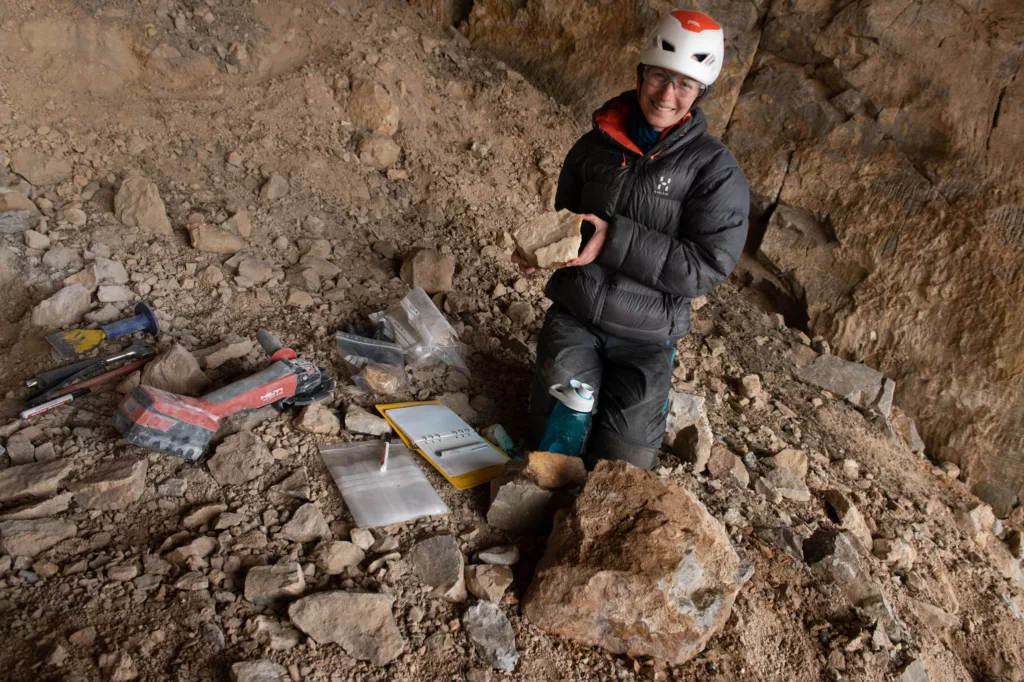
Lindsey: Yeah. It’s the same for me, except for the caves. I mean, you always feel out of your depth doing scientific research because you’re always trying something new and that can be exhausting. But there’s a big reward for me, doing scientific research feels a bit like solving puzzles. I think there’s reasons for detective shows and detective books being so popular. We like this game. In some sense I feel really lucky as a scientific researcher that I get to play that game within a very specific set of rules. That’s the goal of my job, to try and draw together different lines of evidence and figure out something new.
Thomas: But was it clear to you that you would go to university when you were young?
Lindsey: No, my Mum persuaded me. I wanted to build saddles and put horseshoes on horses. But my Mum said she thought I’d enjoy University and I guess she was right.
Gina: What I will add to Lindsey’s quote “If you can see it, you can be it.” – You might not know, there was a series called “The X-Files” in the 90s where one of the key characters was a woman called Dana Scully. So, it’s completely fiction. But she was a really strong independent woman and went about answering questions scientifically – it was all about UFOs and ghosts and paranormal stuff – but she’d apply a scientific process to it. She took no rubbish from anybody along the way and she was my hero as a teenager. I wanted to be her. She was fictional but she was actually very inspirational at that time. There are studies now that show the positive impact the ‘Dana Scully effect’ had on girls who grew up with her as their role model.
Thomas: Okay, so now, we’ve come to the last question I got in mind and it’s also about your youth. What would you like to tell your 18 year old self to ease your path?
Gina: Oh, good question. I think I would tell her to be more confident in herself from the start. I was very unconfident. I couldn’t talk to anybody, but I was always curious and if I was given an opportunity, I would always take it. Even so, I have always been a grey person – after an event no one remembers me. That’s fine, that’s me, but I think I would tell myself to be more confident.
Lindsey: I would go for what Gina’s mentor said: “Do what you enjoy, because it shows in the final product.” That’s a really good lesson. And I think it’s important to remember that lots of the norms of our time are just created things. So we can always change them. It might take a lot of work, but we don’t have to take them as set in stone. That’s hard to see when you’re young, when you’re a junior. Whether consciously or subconsciously, you are trying to fit in. And I think I always try to encourage young people to stop thinking about what options there are already here and instead think about what options you wish there were and how you make them.” Because maybe you can and if you don’t try then you end up later in life realising: “Oh, I didn’t know I could have done that.”
Gina: Helen Sharman was the first British astronaut in the early 90s and she was a chemist. She was driving home from work and heard on the radio that they were searching for the first British astronaut and she thought: “They would never pick me.” By the time she got home on that drive, she thought: “If I don’t apply, then they can’t pick me.” So, she applied and she was the first British astronaut in the end. I think that’s such an inspiring story.
Lindsey: Also, I would keep reminding everybody, of all genders to find champions for yourself. I don’t know if Helen Sharman had a friend or partner or whoever at that time to say: “Yeah, this is perfect for you! You should do this!” Right? It’s not a weakness to also need to be championed by somebody or even to vulnerably put your idea of what you would love to see happening on the table. Try and find that in people around you.
Further Links:
- Facts on Gina Moseley
- Personal website of Lindsey Nicholson
- “A portal to the past” – Washington Post article about the Rolex-funding for Gina Moseleys Greenland Caves Project
Portraits © Robbie Shone, Girls on Ice Austria
Cover © Robbie Shone, Moritz Oberrauch

